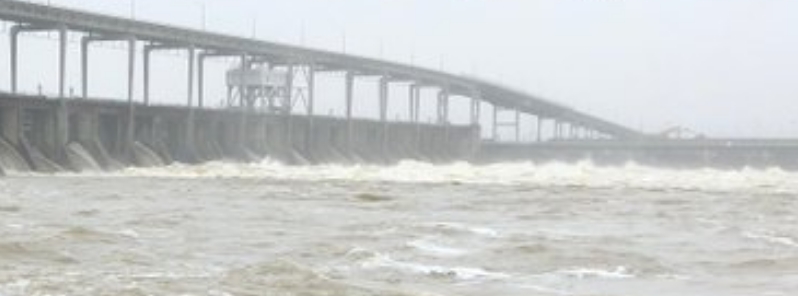Mississippi under state of emergency after historic flooding, above-normal rain triggers inundation and landslides in Tennessee

Incessant heavy rains continued to drench portions of the southern U.S., causing several rivers and dams to overflow. Unprecedented flooding in Mississippi put the state under a state of emergency on February 15, 2020, as Pearl River reached its third-highest level on record at 11.2 m (36.7 feet). Meanwhile, a landslide in Tennessee destroyed several houses as rains in the area have been four times above normal for February.
In Mississippi, among the worst-affected areas is Jackson, where the Pearl River surpassed Major Flood stage and reached 11.2 m (36.7 feet) on Monday, February 17– the state's third-highest level ever.
Prior to this, the government of the state declared a state of emergency on Saturday, February 15.
"This is a historic, unprecedented flood," said Governor Tate Reeves. "With projections showing the potential of this being the third-worst flood in our state’s history, I’ve declared a state of emergency to deploy the necessary resources to take care of all Mississippians impacted."
"Protect yourself and your family– have a plan in place and evacuate if and when you are asked."
According to Emergency Management, over 2 400 structures would be affected by the flooding, mich of them in Hinds County which includes Jackson, and also some in neighboring counties Rankin and Madison.
Evacuation orders were issued in the areas, where around 16 people were saved by the rescue team from submerged homes. Furthermore, around 1 000 homes were reportedly damaged by the waters.
Authorities have yet to disclose full details of damages, but they confirmed that there were no fatalities or injuries.
'PRECARIOUS SITUATION': With the Pearl River continuing to rise in and around Mississippi's capital city, the governor warned residents that it would be days before flood waters start to recede. https://t.co/hZI6wiBY5r pic.twitter.com/hve4eVS9uc
— ABC News (@ABC) February 17, 2020
The #Mississippi flood happening here in Jackson pic.twitter.com/DILZt65AgI
— Chloe Sumrall (@CoCoGoSwim) February 18, 2020
Hundreds of residents in Jackson, Mississippi watched their homes flood over the weekend as the Pearl River crested Monday at 36.8 feet https://t.co/C0uk3ZBcgy pic.twitter.com/9Ob5bee1rG
— CBS News (@CBSNews) February 17, 2020
In Tennessee, historic flooding also prompted evacuations and triggered a landslide in the Chalk Bluff area, sending two houses plunging into the Tennessee River.
Reports said within an hour of evacuation, a vacant home collapsed on Saturday night, while the second home pummelled into the river Sunday, February 16. There were no injuries reported.
Moreover, the river's water levels remained high after the Tennessee Valley Authority (TVA) increased dam flows. The agency said rainfall in the month of February was already more than 400 percent above normal.
TVA said so far this month, the Tennesee Valley has seen on average more than 203 mm (8 inches) of rain, with some areas already receiving more than 305 mm (12 inches) or one foot.
"That amount is on track to challenge the record 295 mm (11.6 inches) of February 2019."
"We’re managing large amounts of inflow and runoff from recent rainfall to bring levels along the upper mainstem back into normal winter ranges."
NEW: Heavy rains and flooding in Hardin County, Tennessee, triggered a landslide that swept two homes into the Tennessee River, with authorities releasing video of the aftermath and the moment one home collapsed; no injuries were reported. More tonight. https://t.co/GFmtPIKRxn pic.twitter.com/VQmjkB6TXr
— World News Tonight (@ABCWorldNews) February 16, 2020
ICYMI: Savannah, Tennessee saw a landslide into the Tennessee River during the overnight hours on Saturday night. No injuries have been reported but a couple homes were lost due to this slide. pic.twitter.com/MqNNf9ugYd
— WeatherNation (@WeatherNation) February 17, 2020
Flooding is going to be a BIG story for the 2020 year…
Tennessee River remains well into the flood stage!
Leaning tree and Tea Lane North Hwy 64 bridge – Hardin County, Tennessee.Permission: Hardin County Fire Department@WeatherBug – Download the app today! #TNwx pic.twitter.com/742hiCmknY
— Live Storm Chasers (@Livestormchaser) February 18, 2020
According to the National Weather Service (NWS), rains up to 51 mm (2 inches) are expected to impact Mississippi from Tuesday to Thursday, February 18 to 20, possibly leading to flash flooding.
Meanwhile, TVA said only about 25 mm (1 inch) of rain is expected this week in Tennessee. "We continue to pull tributary lakes back down towards their normal winter levels to recover flood storage. Rivers below the tributary dams will continue to be elevated."
Weeks of heavy rain have inundated a large portion of the southern US, bringing near-record flooding to portions of Mississippi and Tennessee.
The Pearl River, which meanders through residential and business areas near Jackson, Mississippi, went over its banks. (AP) pic.twitter.com/eqVG1ByjyX
— The Voice of America (@VOANews) February 18, 2020
Mississippi and Tennessee have been deluged with near-record levels of flooding, and more rain is expected. Here's what to know: https://t.co/2bsMwRpg0h pic.twitter.com/UyPKiOFq5r
— TIME (@TIME) February 17, 2020
Terrible flooding across parts of Jackson, Mississippi!
The Pearl River reaches 36ft – As a result, the Country Club golf course of Jackson floods along with many other areas! Drone video from the weekend!
Permission: Hinkle Productions #MSwx #Flood #Flooded #MSwx @WeatherBug pic.twitter.com/5dh1xRXYTS
— Live Storm Chasers (@Livestormchaser) February 17, 2020
Featured image credit: Pickwick Dam

Why use the term “unprecedented” when the event, however unpleasant is nothing of the sort? Presumably so people don’t ask questions about planning laws, among other things.